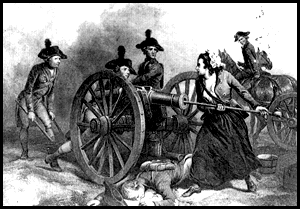|
"Revolutionary
women . . . shared with cheerfulness and gaiety privations and
sufferings to which the situation of their country exposed them.
In every stage of this severe trial, they displayed virtues
that have not always been attributed to their sex. With
a ready acquiescence, with a firmness always cheerful, and a
constancy that never lamented all the sacrifices . . . they yielded
up the conveniences furnished by wealth and commerce, consenting
to share the produce of their labour. They even gave up
without regret a considerable portion of the covering designed
for their own families, to supply the wants of a distressed soldiery;
and heroically suppressed the involuntary sigh which the departure
of their brothers, sons and husbands for camp, rendered from
their bosoms."
--- Chief Justice
John Marshall (1804) |

